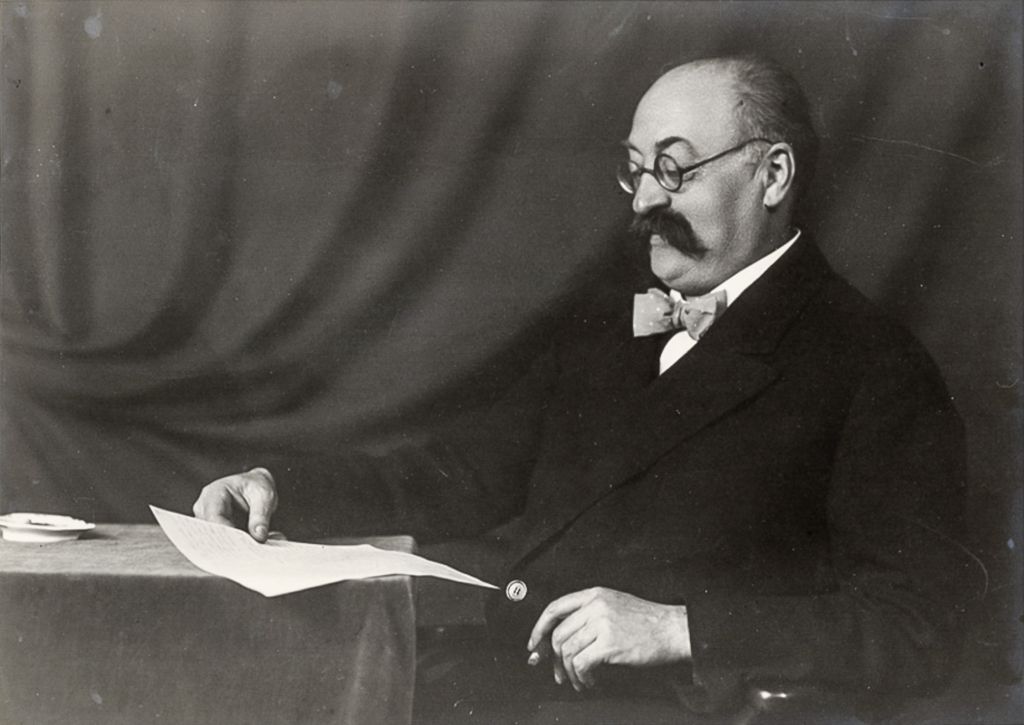From Music Theorist to a Subject of Historical Research
February 2019 witnessed the launch of the three-year third party-funded project Heinrich Schenker’s Diaries 1915–1919: An Annotated Edition. It marks the latest climax in the recent historical interest in this Viennese theoretician.
Heinrich Schenker (1868–1935), known internationally for his theory regarding hierarchical structures in tonal music, has come to occupy an important place in music history. A method of reduction developed by him makes it possible to discern organic relationships within tonal works’ inner workings, phenomena that Schenker referred to as “fundamental line” (Urlinie) and “fundamental structure” (Ursatz). While Schenker himself never occupied an academic post, instead living as an author and private teacher all the way up to his death, many of his Jewish students emigrated to the USA and proceeded to anchor his theories in the academic world. Schenkerian analysis thus came to occupy an important place in the curricula of numerous American institutions of musical training.
In Europe, adoption of Schenker’s teachings was quite hesitant. Apart from the mass displacement caused by Nazi rule, this was due above all Schenker’s polemical tone and anti-modern attitude, both of which played hardly any role in America since his original writings were largely unknown there. In the German-speaking world, however, Schenker’s writings elicited scepticism of a sort that frequently made it more difficult to deal with his theories. Nonetheless, Schenker’s teachings did eventually become established at the Vienna Academy of Music (today’s mdw) during the 1950s. This was thanks to Franz Eibner, a grand-student of Schenker who was a lecturer at the Academy at the time. What began as optional evening courses soon became seminars anchored in the curriculum and eventually led to the creation of a Professorial Chair for Theory According to Heinrich Schenker, as part of which 1976 saw the establishment of the University Course in Theory According to Heinrich Schenker, which was open to students from all majors as well as auditors and also contained lectures that were obligatory for composing and conducting majors.

The professorial chair, first occupied by Eibner, passed to Peter Barcaba in 1986 but was abolished in 1992. The university course remained, but 1997 saw the number of semesters offered reduced from six to four. The course was led from 1994 to 2006 by Martin Eybl, who was succeeded by Patrick Boenke before its ultimate elimination in 2010. Since then, students have still been able to attend individual courses in Schenkerian analysis as free electives, though these course offerings saw further reduction in 2017. Even so, the mdw can still claim to be the only tertiary-level institution in Europe where thorough knowledge of analysis according to Schenker can be acquired in the form of a multi-semester curriculum.
The mdw is not the only place where a reduction in offerings having to do with Schenkerian analysis can be observed. Even in the USA, which is the worldwide centre of “Schenkerism”, a similar development is taking place at many institutions. The main reason for this lies in the greater attention being paid to styles of music from before 1700 and after 1900. This entails dealing with music situated for the most part outside of harmonic tonality, music that can be grasped only insufficiently or not at all using Schenkerian analysis.
In parallel with these developments, however, one can also ascertain rising interest in Schenker’s person from the perspective of cultural and social history, as well as in how his theories figure into the history of ideas. Recent years have seen individual authors pay increased attention to historical questions, which can be attributed partly to the fact that Schenker’s polemical writings are now available in English while numerous documents from his estate have been published at the freely accessible website Schenker Documents Online (SDO).
An initial climax in the ongoing shift in interest toward historical questions was marked by the international symposium Schenker-Traditionen [Schenker Traditions], which took place in conjunction with the exhibition Rebell und Visionär. Heinrich Schenker in Wien [Rebel and Visionary. Heinrich Schenker in Vienna] at the mdw in 2003. And from 2007 to 2010 as well as again from 2014 to 2017, the mdw hosted two projects sponsored by the Austrian Science Fund (FWF) as part of which Schenker’s diaries from 1912–1914, 1918–1925, and 1931–1935 were published at SDO. Finally, in 2016, the mdw offered its first music history seminar on Schenker and his socio-cultural environment.
As a topic of research, Schenker’s biography has proven fertile in many respects. In Vienna, Schenker’s range of activities gave rise to a large network of professional relationships—for he also worked as a composer, conductor, pianist, newspaper critic, and editor of printed music over the course of his life. And one biographical aspect that is interesting above all in the context of identity research is the fact that Schenker was an assimilated Jew of German nationalist ideology who never seriously considered converting to Christianity. Information in this regard is provided by his highly detailed diaries: these reveal not only his personal living situation but also deep insights into Vienna’s cultural scene at the time.
In February 2019, the mdw saw the launch of a further three-year FWF-sponsored project on Schenker that aims to produce a commented edition of his diaries from between 1915 and 1917 along with his politically tinged post-war diary of 1918/19. These texts (along with their English translations) will be placed on the SDO website by 2022, marking the conclusion of the project to publish a complete bilingual edition of his diaries. And with this project, headed by the author of these lines, the mdw will have once again underlined its status as an institution with a strong emphasis on Schenker.

